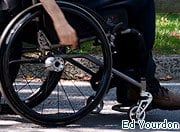A severely disabled man from Glasgow has mounted a challenge in Scotland’s highest court claiming he is “being discriminated against” because he is unable to end his own life.
Gordon Ross, 66, who suffers from Parkinson’s disease, has asked the court to rule that the Lord Advocate must produce guidance on assisted suicide, similar to England and Wales.
But pro-life group Care Not Killing said that there are great pressures on vulnerable people to avoid placing “unfair burdens” on others.
Crystal clear
Members of the Scottish Parliament are set to vote on a Bill which would legalise assisted suicide in the country.
Judge Lord Doherty has reserved his decision and said he will not give a ruling about Mr Ross’s case until a later date.
Lawyers acting for the Lord Advocate said: “The lord advocate’s policy is crystal clear. There is no lack of clarity requiring any further statement.”
Pressure
The clarity of the existing law was also commented on by Dr Gordon Macdonald, spokesman for campaign group Care Not Killing.
He drew attention to a previous statement by the Lord Advocate, which said that it would be hard to envisage a situation where it would not be in the public interest to prosecute using homicide laws.
Dr Macdonald has said: “In today’s individualistic society the pressures on sick, disabled and elderly people to avoid placing ‘unfair burdens’ on others are very great.
“Maintaining the law’s protection of this silent and vulnerable majority is more important than giving choices to a minority of strong-minded and highly resolute people.”
Significant flaws
The Assisted Suicide (Scotland) Bill is being considered at Holyrood and is expected to be voted on by the end of May.
The Scottish Parliament’s Health and Sport Committee has said that plans to introduce assisted suicide in Scotland are significantly flawed.
It has heard varied arguments against the controversial Assisted Suicide (Scotland) Bill in recent months.
Unacceptable
A report by the Health and Sport Committee said: “The committee believes the bill contains significant flaws. These present major challenges as to whether the bill can be progressed.”
It noted the observation by the British Medical Association that “there is no way to guarantee the absence of coercion in the context of assisted suicide”.
And it pointed out that there is an “unacceptable” lack of clarity in some of the language in the Bill.
A petition against the proposals has been signed by over 15,000 people.


